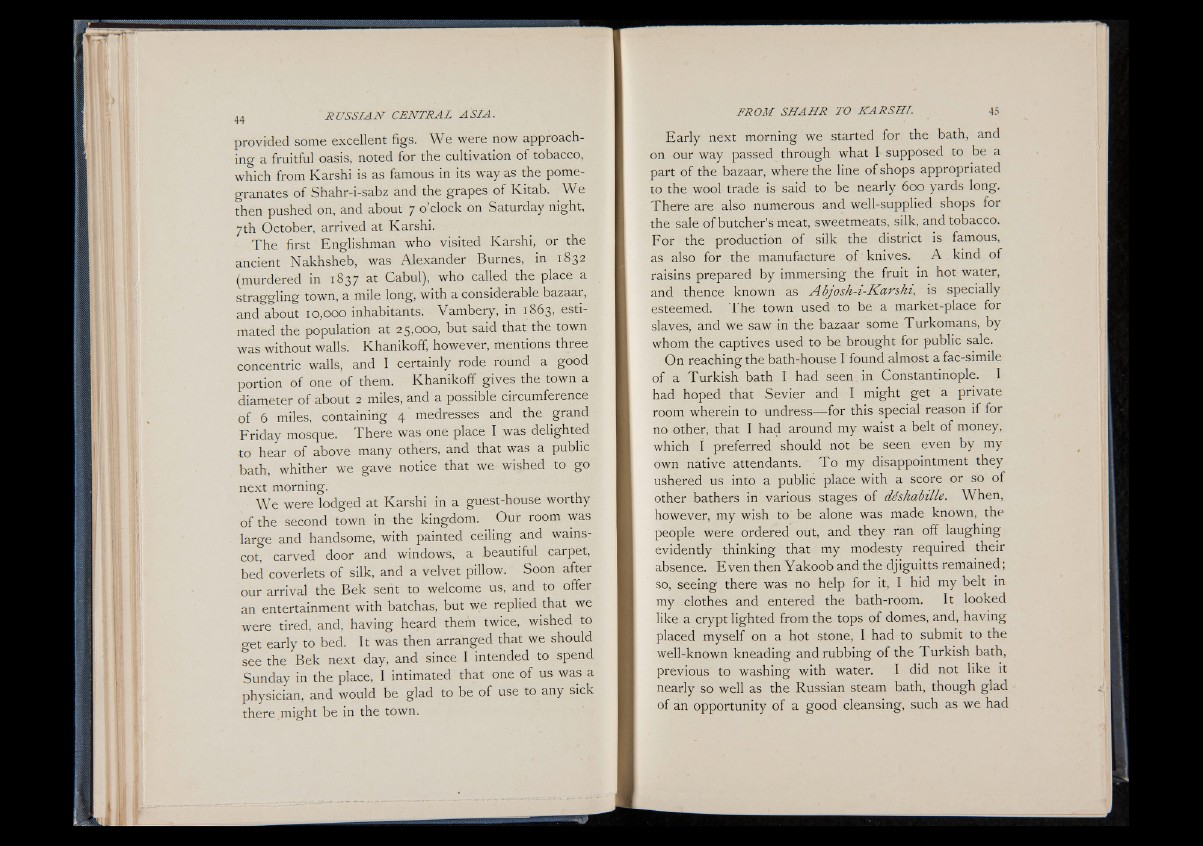
provided some excellent figs. W e were now approaching
a fruitful oasis, noted for the cultivation of tobacco,
which from Karshi is as famous in its way as the pomegranates
of Shahr-i-sabz and the grapes of Kitab. W e
then pushed on, and about 7 o’clock on Saturday night,
7th October, arrived at Karshi.
The first Englishman who visited Karshi, or the
ancient Nakhsheb, was Alexander Burnes, in 1832
(murdered in 1837 jilt Cabul), who called the place a
straggling town, a mile long, with a considerable bazaar,
and about 10,000 inhabitants. Vambery, in 1863, estimated
the population at 25,000, but said that the town
was without walls. Khanikoff, however, mentions three
concentric walls, and I certainly rode round a good
portion of one of them. Khanikoff gives the town a
diameter of about 2 miles, and a possible circumference
of 6 miles, containing 4 medresses and the grand
Friday mosque. There was one place I was delighted
to hear of above many others, and that was a public
bath, whither we gave notice that we wished to go
next morning.
W e were lodged at Karshi in a guest-house worthy
of the second town in the kingdom. Our room was
large and handsome, with painted ceiling and wainscot,
carved door and windows, a beautiful carpet,
bed coverlets of silk, and a velvet pillow. Soon after
our arrival the Bek sent to welcome us, and to offer
an entertainment with batchas, but w;e replied that we
were tired, and, having heard them twice, wished to
get early to bed. It was then arranged that we should
see the Bek next day, and since I intended to spend
Sunday in the place, I intimated that one of us was a
physician, and would be glad to be of use to any sick
there,might be in the town.
Early next morning we started for the bath, and
on our way passed through what I supposed to be a
part of the bazaar, where the line of shops appropriated
to the wool trade is said to be nearly 600 yards long.
There are also numerous and well-supplied shops for
the sale of butcher’s meat, sweetmeats, silk, and tobacco.
For the production of silk the district is famous,
as also for the manufacture of knives. A kind of
raisins prepared by immersing the fruit in hot water,
and thence known as Abjosh-i-Karshi, is -specially
esteemed. The town used to be a market-place for
slaves, and we saw in the bazaar some Turkomans, by
whom the captives used to be brought for public sale.
On reaching the bath-house I found almost a fac-simile
of a Turkish bath I had seen in Constantinople. I
had hoped that Sevier and I might get a private
room wherein to undress— for this special reason if for
no other, that I had around my waist a belt of money,
which Î preferred should not be seen even by my
own native attendants. T o my disappointment they
ushered us into a public place with a score or so of
other bathers in various stages o f déshabille. When,
however, my wish to be alone was made known, the
people were ordered out, and they ran off laughing
evidently thinking that my modesty required their
absence. Even then Yakoob and the djiguitts remained ;
so, seeing there was no help for it, I hid my belt in
my clothes and entered the bath-room. It looked
like a crypt lighted from the tops of domes, and, having
placed myself on a hot stone, I had to submit to the
well-known kneading and rubbing of the Turkish bath,
previous to washing with water. I did not like it
nearly so well as the Russian steam bath, though glad
of an opportunity of a good cleansing, such as we had